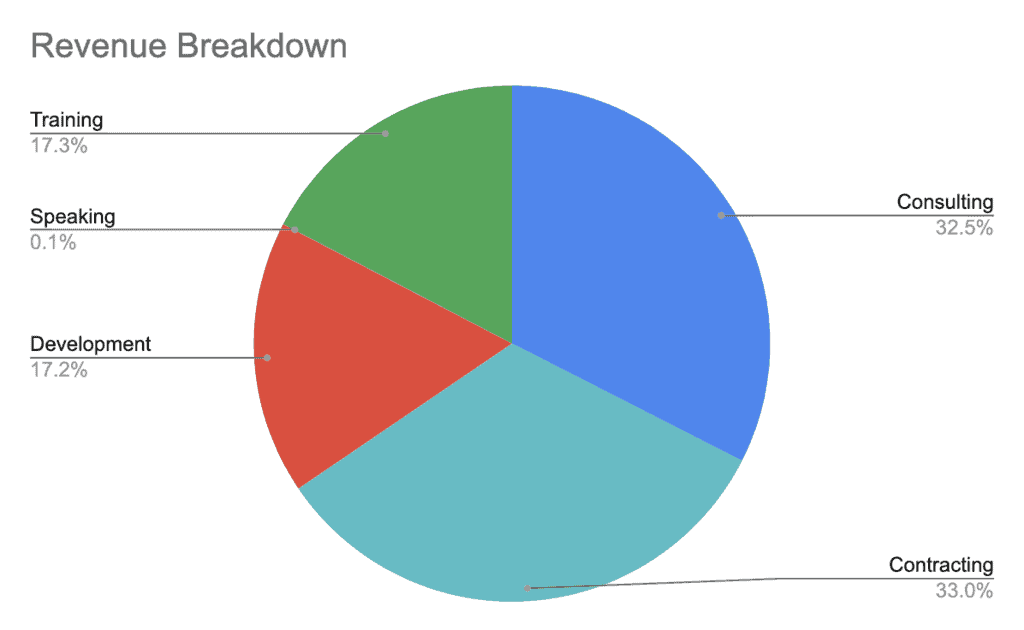
Yan Cui
I help clients go faster for less using serverless technologies.
It’s been 12 months since I left full-time employment to fly solo as an independent consultant. After 15 years of full-time employment, I had to learn a lot, very quickly, after making this career change.
Honestly, life has been great since. Even a global pandemic hasn’t managed to dampen my mood! In case you’re considering a career change and thinking about going solo, here is what I have learnt so far.
But first, a word about what I do and my niche.
In short, I help companies go faster and build more scalable and resilient systems by adopting serverless technologies.
Finance
You can drastically increase your earning potential as an independent consultant. But, this depends on lots of other factors such as location.
The average developer salary in some parts of US (e.g. San Francisco, New York, Seattle) is much higher than the rest of the world, especially if you work for a tech giant such as Facebook, Amazon, Netflix, Microsoft or Google. As a freelancer, you would struggle to reach the same level of earning. It’s not uncommon for a senior developer at these companies to earn over $250,000 once you factor in stock grants (see levels.fyi for more details).
In the UK and Europe, however, the average developer salary is much lower and there’s a very hard ceiling. There are few jobs that pay over £100,000 per year. Stock grants are not common and they are not as valuable either, reflected by the fact that there are few unicorns on this side of the pond.
p.s. check out the AWS Salary Survey for 2019/2020, it also clearly illustrates this pay discrepancy between the US and Europe.
As a freelancer, you stand to double your earning potential before you even factor in the better tax efficiency. That is, if you can guarantee a steady stream of work engagements. You do incur additional costs though – health insurance, professional insurance, accounting cost, banking charges and more. But these costs are tiny compared to what you stand to gain.
In my last full-time job as a Principal Engineer at DAZN, I was earning £120,000 per year plus up to 30% in bonus. This puts me around the top 1% of taxpayers in the UK, but still well below the average senior developer salary in San Francisco.
On the other hand, as a senior developer with AWS experience, you can comfortably earn £600/day as a contractor in London. Which puts you at £144,000 per year if you work 48 weeks and take 4 weeks off. However, this might be changing soon when IR35 is eventually rolled out to the private sector (delayed until April 2021).
As a consultant, I charge much higher day rate compared to a contractor. However, my engagements are also very short – typically just a few days per engagement. Which means, I need to generate a steady stream of work. This is why you hear freelancers talk about “the pipeline” all the time.
So far, I have been very fortunate and have found a moderate amount of success. All my engagements have come via inbound requests from readers of my blog or students of my video courses. I can only attribute my success thus far to luck and good decisions I made years ago – to start blogging, to start public speaking, and to offer free help to anyone who asks for it on social media. All these have worked together to build up my brand and a network of people who trust my opinions.
But it’s all luck! I was not doing it consciously and had no long term plan whatever. The good news is that someone with a plan can build up a brand very quickly nowadays using the power of social media. A perfect example is Daniel Vassallo, who has built up a strong brand within a matter of months and have also launched a book, a video course and a product in that time.
Control
An even bigger incentive to go independent is that you have more control over your work-life balance and what you work on. After 15 years of working 50+ hours per week (peaked at ~80 at one point), I now work an average of 3 to 4 days per week and it’s wonderful.
And, I have more than doubled my yearly salary at DAZN in the last 12 months. Of course, the revenue I generated in the last year belongs to my limited company and personally, I’m on minimum wage. Fortunately, I don’t have immediate money needs and can keep the money in the company or invest them.
Of course, the more you work, the more you’ll likely earn. It’s therefore important for you to be clear about why you want to go independent!
Personally, my goal was to work less while maintaining or improving my level of earning. This dictates how much work and what kind of work I take on, and how much I charge for my services.
I turned down several financially enticing proposals because either:
- It’s a lot of work at a lower rate, which doesn’t align with my goal of working less and having more time to myself.
- The projects don’t align with my personal interest.
Equally, I have also taken on work that doesn’t pay my usual rates because they were projects that I really wanted to take part in. Again, those decisions are mine and mine alone.
There are times when you have to make compromises. I have been fortunate so far that I have had a steady stream of engagements. But multiple people have warned me about the ups and downs of a freelance career, and there will be months when you don’t get any work. If you can’t find enough work to sustain the quality of life you want then you need to adapt.
To mitigate this risk, I have diversified the range of services I provide to ensure that I have a healthy stream of income from different avenues. This included taking my Production-Ready Serverless workshop public and running both in-person as well as online workshops.

After years of working long hours to generate wealth for others, and at the direction of my superiors, it has been so refreshing to be in control of how I spent my days.
Learning
Early on, I had to learn a lot about the business side of things, e.g.
- How to set up a limited company in the UK?
- How does corporate tax works?
- How do I do basic accounting and payrolls?
- Should I register for VAT? Which VAT scheme is right for me?
- What business insurance cover do I need to take out?
- How do I set up health insurance and pension scheme?
- …
I also had to learn about managing client relationships and marketing. Not to mention dealing with legal contracts and corporate procurement processes (which is a whole different level of pain).
The biggest advantage of being an independent consultant is that I get a very broad perspective. In the last 12 months, I have worked with 27 clients. Some are start-ups, others are large enterprises. Some are government agencies, others operate in regulated environments. Some are taking their first step in AWS, others have been building with AWS and serverless for years. All have an interesting problem to solve, and you always learn something.
Being an independent consultant has allowed me to work in a wide variety of contexts and squeeze in years worth of learning in a short space of time.
And I’ve also been learning a lot about pricing my work from the likes of Jonathan Stark and his pricing seminar. The Million Dollar Consulting by Alan Weiss is also a must-read if you want to maximize your earning potential as an independent consultant. I’m still learning an awful lot about consulting and I feel like I’ve barely scratched the surface!
Challenges
Consulting can be very demanding work too. After all, clients are paying you a lot of money and you are expected to deliver instant value.
You need to get up-to-speed on new domains quickly so you can understand the challenges your client is facing.
Techniques such as five-whys are also very useful for teasing out the real problem. Often, you’ll be asked “how” to implement a solution the client has in mind. But the root cause might lie somewhere else completely! Once you understand the root cause you might be able to offer an even better solution. One that addresses the root cause and has a bigger positive impact on the client than simply doing what was asked.
When you are working with many clients at the same time, you also need to context switch quickly. Take plenty of notes, but keep them short and concise. Your notes should have enough information so you can rebuild your mental model and prepare for your next meeting with the client in just a few minutes. You are expected to know what had been discussed in the previous meetings and be able to provide value instantly.
Socially, it can be pretty lonely! Sure, you might spend a lot of time meeting with clients, but these aren’t social calls. And you don’t have teammates, people that you build a strong social bond with.
You might also spend a lot of time travelling, so that’s a lot of time away from your family. Of all the challenges, this was easily the biggest one for me. But, COVID19 has changed that, massively.
COVID19
Since the outbreak reached these shores, all my engagements have gone remote.
On the one hand, there is no more travelling! Which means I have reclaimed a lot of my time to myself, and I get to spend more time with my family. Luckily for me, all my consulting activities translate well to online.
On the other hand, it has also created a lot of uncertainties amongst my clientele and potential customers. But, from what I can see, companies are still investing in their teams and projects and bringing in outside help. So it’s not all doom and gloom for consultants! In fact, my average monthly revenue is up 30% since February, although I’m not sure if there are any causal links to the outbreak.
Wrap up
So that’s my experience as an independent consultant so far.
As a summary, I have to say I’m loving it!
I’m earning far more than I ever did as a full-time employee and I have more control over what I work on and how much I work (ps. I’m working less too).
And, I’m learning lots of different things, some more eagerly than others.
It’s a career change that I had envisioned for myself for many years but never worked up the courage to actually take the leap. And after this first 12 months, I can’t imagine going back to fulltime employment. Hopefully, I won’t have to!
Whenever you’re ready, here are 3 ways I can help you:
- Production-Ready Serverless: Join 20+ AWS Heroes & Community Builders and 1000+ other students in levelling up your serverless game. This is your one-stop shop for quickly levelling up your serverless skills.
- I help clients launch product ideas, improve their development processes and upskill their teams. If you’d like to work together, then let’s get in touch.
- Join my community on Discord, ask questions, and join the discussion on all things AWS and Serverless.

